#i'm aware
Text
Okay quasi-hate-reading a book review to avoid work and like


Did these people never have to read The Scarlet Letter in high school? Never heard of just...any pre-online moral panic? With trials and court intrigues and the House Unamerican Activities Committee?
Truly fascinated by the life one must have lived and the bubble one must have been in that 'gossip isn't just harmless fun and can have consequences now, because of Online' is a thought one might think worth publishing.
87 notes
·
View notes
Text
forgone faith
pairing: Monsignor/Reader (can be platonic or romantic)
summary: It’s too late to go back now. You might as well continue pushing forward. “Some part of you, however small, lays its eyes on me and finds belonging and understanding.” The chess game has been neglected since you first accused the Monsignor of being threatened by you, and you can’t attribute that to mere coincidence.
“Your desires are much like mine,” you elaborate, your heart hammering in your chest. “I see the way you look at other men, the way you look at me. You don’t practice what you preach… and you are no saint.” You finish.
You're a patient at Briarcliff Manor, and your simple chess matches with the Monsignor quickly escalate into something more.
notes: The reader was born a woman, but is under the trans/nonbinary umbrella. Their identity isn’t explicitly stated, so feel free to imagine however you’d like. (I usually write the reader from my perspective as a transmasc person, if that’s helpful to know.) Otherwise, no pronouns or physical descriptors are used; race is kept ambiguous.
word count: 3.9k | ao3 version

warnings: period-typical transphobia (not the focus of this fic in the slightest), the questioning/scrutiny of religion (mostly just American Catholicism), conversations about gender identity (grounded in the time period and its prejudiced beliefs, unfortunately), canon-typical violence, electroshock therapy, torture, loss of consciousness, canonical Nazi character
“You have the devil in you.”
You look up from the chess game. In a different time, with different people, that kind of remark would have sent your heart racing. You would’ve been terrified at the thought of your identity being thrust into the open so easily, despite your seemingly endless attempts to keep the skeletons in your dusty closet. Now, as you sit in the Briarcliff Manor Sanitarium across from a priest, the remark only makes you huff a laugh.
You’re not sure how these chess games started, in all honesty. As the director of the Sanitarium, Monsignor Timothy Howard presides over the entire building. You hadn’t spoken to him much, save for one fateful day when you found yourself cleaning the kitchen. The priest had walked in with a slight pull to his lips, before requesting your company in a game of chess. You—desiring something else to do—agreed within moments. From there, one chess game turned into two, which turned into three, which turned into games once or twice a week.
You’re abruptly thrown back to reality as the priest successfully takes one of your pieces. It takes you a few moments to remember what he just said—You have the devil in you—and several more moments to respond.
“And how about you?” You remember to ask, moving your chess piece before leveling the Monsignor with an intent look. You’re glad this conversation is occurring behind closed doors. While your first games had occurred in the kitchens, they soon migrated to the priest’s office. “I’ve seen you observing me, watching me.”
The man is entirely silent. His brows are furrowed and he’s staring at the board in concentration, but you know he isn’t thinking about chess. He’s contemplating what you’ve just said and, admittedly, you’re surprised. You had fully expected him to deny the accusation immediately. Sensing that he will remain silent for a while longer, you continue talking. “Do you think I haven’t noticed? The preferential treatment? I haven’t had a beating in weeks, and I definitely deserve it—according to Sister Jude, at least.”
The Monsignor stiffens. “I’m not sure what you’re talking about,” he replies lightly, finally making his move.
You decide to be straightforward. You don’t have much to lose, after all (no one at Briarcliff does). “Does your god care about people like me?” You hum. You don’t need to elaborate any further for him to understand what you’re alluding to. After all, your identity is the reason you’re locked behind these walls. You were born a woman. You are not one. It should be quite simple, but to everyone else, it is not.
“God accepts all of His children into heaven,” the Monsignor says in a practiced recitation. You wonder how many people have been fed that lie. From what you’ve seen and experienced, American Catholicism has traditionally repelled queerness in any form.
“Even the broken ones?” You ask, watching as his eyebrows furrow for a fraction of a second. You don’t think yourself to be broken—you’re simply borrowing the words from accusations that have been hurled at you over the years. “The deluded ones?” You raise your eyebrows and look at him expectantly.
“Even them,” the Monsignor says, suddenly breaking eye contact to look down at his pieces. You don’t think you’re imagining how he dodged your gaze, or the raspy quality his voice adopted.
“Even me,” you supplement. A fleeting smile crosses your face. You clasp your hands. “How I wish that were true.”
“You do not need to wish for it,” the Monsignor remarks, clasping his hands in a mimicry (unconscious or conscious, you’re not quite sure) of your own posture. “You need only… believe it.” His statement is punctuated by the move he makes with his rook.
“Even when you don’t?” You ask, moving your bishop in response.
“I believe you are misguided,” the Monsignor says. Irritation prickles along your skin. You don’t care what a man like him thinks of you. And yet… the accusation still hurts.
“And I believe that you are threatened by me,” you blurt out, before you can contemplate the consequences of speaking so freely. Perhaps a small part of you is feeling vindictive.
“Threatened?” The Monsignor laughs in evident amusement. It’s not hard to notice that his laugh sounds strained. He wouldn’t be so vehemently opposed to this turn in conversation unless he had something to hide. And you know all about hiding—you were forced to hide who you were for nearly your entire life, just to survive. It’s frighteningly easy to peel back the layers of the Monsignor’s disguise and dig your fingers into the essence of his being.
It’s too late to go back now. You might as well continue pushing forward. “Some part of you, however small, lays its eyes on me and finds belonging and understanding.” The chess game has been neglected since you first accused him of being threatened by you, and you can’t attribute that to mere coincidence.
“Your desires are much like mine,” you elaborate, your heart hammering in your chest. “I see the way you look at other men, the way you look at me. You don’t practice what you preach… and you are no saint.” You finish.
Suddenly, the Monsignor slams his hands on the table. The chessboard rattles and some of the pieces tip over, terminating your game. You hardly have the time to regret what you’ve done before you’re being yanked up by the collar of your shirt and shoved into the wall.
There’s a dangerous look in the Monsignor’s eyes. You’ve hit a nerve, it seems. “Don’t ever speak to me like that again,” the priest hisses, his calm mask slipping right off. There’s a hint of a snarl on his lips. His fist is tightened around your collar, turning his knuckles white with exertion. “Or I will ensure that you never see the light of day.”
You remain silent, your objections unspoken. You could never do that to me, because you know, deep down, that what I’m saying rings true, you recite in your mind. The Monsignor’s grip tightens and his fingers claw at your shirt, to the point that you have to stand up taller to avoid losing your breath.
“Do you understand?” He hisses, his breath hitting your neck.
“I understand,” you say, if only to placate him. You’ve said all that you wanted to say, and that is more than enough. You can already tell that the priest is ruminating on your conversation, picking it apart within the darkest corners of his mind. That’s the best you can hope for.
The Monsignor’s grip finally leaves your collar and you cough at the stress placed on your throat. Your vision momentarily blurring, you can’t see the emotions running across his face: rage, irritation, fear, regret. “Leave.” He demands.
You turn on your heel and leave without hesitation.
In hindsight, you should’ve prioritized self-preservation over trying to prove a point to the Monsignor. Although, in the time immediately following your conversation, you do not see any repercussions. You go to meals, sit in the common room, and return to your cell. Everything is normal, unchanged.
Then you mouth off to Sister Jude, and you’re roughly dragged into her office. You had gotten too confident, you think to yourself as you’re punished. Sister Jude’s arm winds back again and again. At some point, your vision spirals and you lose consciousness. It’s a small mercy.
When you wake up, you find yourself in solitary. You sit in the unassuming cell, bruises forming along your skin from Sister Jude’s harsh punishment. When you’re finally released, you make your way back to your cell mechanically. Where you had felt fury and determination before, you only feel empty. You’re starting to slip off the deep end, you think.
Unsurprisingly, your chess games are no more. You catch glimpses of the Monsignor around the building, but you don’t speak to him. Sometimes, you get a prickling feeling—as if there are eyes on your back. But when you turn around, you don’t find anyone there.
It’s rather easy to fade behind the walls of the Sanitarium. That is what the building is designed for, essentially. There is no color, no life inside these walls. The medications you’re given certainly don’t help in that regard, either. You soon find yourself trapped in a never-ending cycle of acting out, being punished, getting thrown in solitary, and returning to your cell. Indeed, you’re finding yourself in Sister Jude’s office more often than not these days. And you don’t enjoy the pain—not necessarily. But it does make you feel alive—more alive than you’ve felt in a long time. Regrettably, it doesn’t take the nun very long to catch on.
“We may have to resort to… other forms of rehabilitation,” Sister Jude murmurs, hovering in front of her assorted canes before turning to you. There’s nothing in her eyes—no glimmer of emotion for you to latch onto. “You’re dismissed.” You can’t summon the courage to question her about just what is happening or why she’s dismissing you, so you leave with trepidation curdling in your chest. Sister Jude is many things, but merciful is not one of them. Your punishment hasn’t come yet.
You’re reminded of Sister Jude’s merciless nature when you’re tugged off your mattress in the middle of the night by two staff members, carelessly manhandled through the halls until you’re shoved on a cot and tied down with leather restraints. You try to fight back, but you’re outnumbered. You strain against your bonds, but they don’t budge—instead burning into your skin and leaving irritated marks.
Dr. Arthur Arden strolls in, and any hope you had for escape swiftly dies in your chest. Evidently, your dread and disgust show on your face, because the doctor smiles menacingly. He moves to stand at the side of the bed, and your heart drops to your stomach as you see the machinery and begin to connect the dots. You’re going to undergo electroshock therapy. Your movements grow more frantic as you try to kick out, pull your restraints off, do anything other than lie helplessly on the bed. Something is shoved in your mouth, inhibiting your ability to speak, and a headpiece is forced on your forehead. You stare up at the ceiling, a tear falling down your face as you try to come to terms with what’s about to happen. In all your time at Briarcliff, you’ve never had to undergo this particular treatment. You’ve seen the impact it can have on patients—turning the most headstrong and individualistic people into shivering wrecks.
You try one last time to rip yourself free, but the restraints don’t budge. Dr. Arden looms over you and you feel your hands shaking in horrid anticipation. Sister Jude is standing on the other side of the bed, looking entirely unaffected by the prospect of causing you irreparable damage. Arden says something to Sister Jude—something you can’t quite make out—and he twists the knob of one of the machines. Immediately you feel as if your body is connected with raw electricity, as pain surges up your limbs, through your skin and into your very core.
You have a somewhat high pain tolerance. You survived Sister Jude’s cruel punishments. But this? This is too much. You hear someone screaming—loud, raw, broken . It takes you a moment to realize the screams are crawling up your throat and spilling from your own lips. Flickers of life pass before your eyes.
“Even the broken ones?” A shadowed form asks.
The Monsignor stares at you, his form blurring and his eyes melting into tears that fall from his empty eye sockets. “Even them.”
There’s a hand on your forearm, holding you down as you practically levitate with how hard you’re shaking and trembling. The pain is blinding, creating patterns that float before your eyes and run down your skin. Arden’s blurred figure hovers over you, disappearing for a moment before returning to look down at you. The pressure is like nothing you have ever felt before, and there isn’t a part of your body that doesn’t hurt.
You’re shivering now, your teeth chattering around the mouthpiece. Another tear slips down your face. You’re struck with one awful realization: you’re going to die. You’re going to rot in Briarcliff—your body dumped somewhere to decay and disintegrate. Another desperate scream falls from your lips, but you know it’s far too late to do anything. Sister Jude and Arden show no sign of stopping. Your vision is swirling before you, shadows creeping from the corners of your eyes and oozing down the walls.
Idly, you hear raised voices. You can’t see much of anything, and you can’t make out the conversations that are occurring over the horrible static and high-pitched ringing echoing in your ears. Your eyes are blurring with unshed tears. You blink to clear your vision, only to find a dark shadow on your left. It looks like an angel, its eyes gleaming as it stares down at you. It has some sort of mass behind it—feathered wings, you realize. It regards you with a sad smile, slowly rounding the bed to stand at your side. Your teeth are aching, your head feels as if it’s about to burst, and your chest has never felt so tight. Your heart is racing in your ears, and you feel your fingers clenching against your will. Just as you try to reach out to the figure next to you, there’s a harsh bang and the demon—angel?—disappears. The last thing you see before you’re blissfully brought into unconsciousness is a new blurry silhouette hovering over you, a concerned expression on their face.
You float in and out of consciousness, inhabiting an eerie middle ground between wakefulness and slumber. Pain is a constant companion, forcing you down into what you can only assume is a mattress. Your skin feels too tight; your eyes feel as if they’re going to pop out of your head; and your temple feels as if someone has been consistently hammering at it. You can’t even move and, amidst your best efforts, your eyes refuse to open.
There are brief traces of what you can assume to be happening around you. A stinging pain tingles and burrows into your forearm. Sometimes, you can catch hints of voices speaking over you. Occasionally, there is the steady pressure of a hand on your wrist.
When you finally wake, your mouth is so dry that you nearly choke on your own breath. The nurse standing at your side is quick to hand you a cup of water, which you gulp down eagerly. You cough and make several attempts to clear your throat, only for nothing to come out. The nurse informs you that you’ve been unconscious for several days following the electroshock therapy. You nod, having expected as much. The ward is entirely empty, save for you and the nurse standing across from you. You take a look at the table next to your bed, huffing an amused breath as your eyes catch on the small figurine on the side table. Upon closer examination, it appears to be… the Virgin Mary? The thought fills you with inexplicable amusement. Although, above all, the figurine provokes your curiosity: who brought it here?
As if sensing your thoughts, the nurse answers your question. “The Monsignor has been visiting rather frequently,” she states. Her tone is clinical, but her expression betrays a little of her confusion. Evidently, she’s wondering why he has made multiple visits.
On the one hand, you’re not surprised—you’re sure the Monsignor visits any patients in the ward to pray for them. On the other hand, you’re certain that you would’ve lost that privilege after your quarrel weeks ago. The idea that the Monsignor has gone out of his way to visit you multiple times… You don’t know what to make of that.
Your recovery is slow going and dreadfully boring. When you’re finally moved out of the ward, you don’t return to your cell—to your surprise. Instead, you’re given a room on a different floor—one with an actual bed and a window.
And if you had special privileges before, you’re not even sure what you have now. It’s like you have some sort of… diplomatic immunity. Where the guards were harsh and rough with you before, they now hesitate to even touch you. You don’t have to do any chores, you don’t have to take any pills aside from the ones the nurse gives you to take away the pain. You spend nearly all of your time in your new room.
You’re still slipping away.
The Monsignor visits as you’re growing restless with boredom. He knocks once, twice on the door. After a few moments, you give him permission to enter. The priest opens the door with tremendous speed, his eyes immediately finding you and latching onto you with feverish intensity. He grabs a chair from the table in the corner of the room and sets it near your bedside, before taking a seat.
For several moments, there is nothing but silence. The Monsignor seems to be contemplating his next words, as he stares down at his clasped hands with a blank expression. When he finally looks up at you, you’re surprised to see a remorseful expression on his face. “I am sorry,” he murmurs. “I only wish I could have arrived earlier, before the damage was done.” His fingers move along the beads of his rosary in an unconscious gesture.
Realization crashes down on you, as you realize that the Monsignor must’ve been the person looking down at you as you lost consciousness. He must’ve been the cause for the raised voices you were hearing as you underwent the procedure.
Admittedly, you don’t know what to say. Your eyes are suddenly incredibly dry and you reach up to rub at them, taking a bit longer than normal to complete the action. Monsignor’s eyes track your hands even as you place them in your lap.
“Let me see,” the priest says. You bring your hands up to show him. Indeed, they’re fidgeting and trembling. You’ve long given up on trying to get them to stop, recognizing the ailment as a side effect to the torture you went through. He brings his hands under yours and clasps them with incredible gentleness.
The Monsignor’s eyes look glassy and his lips are pressed in a thin line, as if he’s troubled. His hands slip from yours as a frown overtakes his face. “You must excuse me,” he says, averting his gaze and fleeing the room. You blink at him in confusion. It’s not like him to simply… end a conversation like that. You watch his retreating back, taking note of how tight his shoulders are drawn and the way his fists are clenched at his sides. He looks strangely rattled.
You’re left to contemplate his sudden departure in solitude. As you think back to the look on the Monsignor’s face, you rationalize that his concern was of a professional nature. He doesn’t care about you—he just cares about the implications of a patient being harmed under his leadership. You shake your head. That excuse sounds flimsy, even to you.
In light of his unexplained exit, you don’t expect to see the Monsignor for several days. When he walks into your room at approximately the same time the next day, you can’t quite conceal your surprise. If he senses your confusion, he ignores it—instead deigning to sit at the table in the corner of the room.
“Care to join me?” The Monsignor asks, motioning to the chess set he brought with him. You nod and get up from your bed, walking over to take a seat across from him. For a while, there’s nothing but a tense silence. Once it is broken, you find that the conversation is easy and quiet. There is still that lingering tension settling in the air—especially when you consider the accusations you hurled at him—but it doesn’t hamper the mood considerably.
Your hands continue to shake when you go to make a move, but the Monsignor steadies your hand and ensures you don’t knock over any other pieces. He doesn’t bring up your conversation all that time ago, yet it clings to the air around you like a vice. Surprisingly, the two of you mostly talk about inane things. You find it strangely refreshing—you can’t remember the last time you were treated like a person in Briarcliff.
When he leaves for the day after a successful few chess games, you think you may finally be getting better. You lie in bed that night for a bit longer than normal, unable to chase thoughts of the Monsignor away from your waking mind. When you finally do fall asleep, he follows you to your dreams.
Any trace of hope you had quickly fades as you wake the next morning; you’re immediately greeted with a ringing sound in your ears and a pounding headache. When you get out of bed, you find that the world is spinning beneath you. One moment, you’re standing up; the next, you’re lying on your side on the ground. You’re shivering and shaking with phantom bursts of electricity. Your teeth are chattering and clacking; your hands are trembling uncontrollably. It’s been weeks since the procedure, yet its aftereffects are still persistent.
Your collision with the ground must be loud, because within moments, the Monsignor is walking into the room. He looks worriedly around the space, his eyes settling on you and his expression falling to something far too close to worry as he sees you on the floor. The priest kneels down at your side and helps you up to a sitting position. You think he’s saying something to you, but it’s too hard to make out amidst the tunneling in your ears and the jackhammering sensation ripping at your temple.
The expression on the Monsignor’s face is so open and honest. Confused and in pain, you can’t help but reach out to him. Leaning forward, you wrap your arms around his shoulders and try to breathe. To your surprise, Timothy doesn’t push you away. Instead, he embraces you back—with a reassuringly strong grip, as if he’s afraid to let you go. You lean into his shoulder, silent tears streaming down your cheeks as you hug him. Your body is still wracked with tremors. If he notices that his shoulder is growing damp with your tears, he doesn’t comment on it.
When he finally does speak, it’s with a frightening amount of sincerity. “Tell me what I can do,” the man implores you, briefly leaning back and bringing his hands up to cradle your cheeks. His eyes are gleaming with unapologetic affection—a sentiment you still refuse to believe you’re provoking in him. “Anything. I’ll do it.”
“Just…” You break off, lost for words. You can’t remember the last time you’ve been treated with such kindness. Briarcliff has molded you into someone who only knows cruelty. Now that you’re being shown compassion, you don’t know what to do with it. “...Sit with me.” You eventually request. The Monsignor leans closer and holds you tighter.
In the coming days, Timothy will enlist the help of a doctor with vast experience treating patients with similar side effects from electroshock therapy. In the coming days, Timothy will grow more and more hesitant to leave your side. Your chess games will morph into matches, and you will soon be unable to deny that the Monsignor truly cares for you.
In the meantime, you’re content to sit on the floor, safely shielded from the world’s harms in his embrace.

endnotes: this was fun to write. and yes, this was born out of my religious trauma. i will not be fielding criticisms, concerns, or questions about that at this time. LOLLL
peep the shachath reference, mwahahhahaha. also, it/its pronouns for shachath, 'cause i said so!!!!
obligatory fic playlist

thanks for reading! <3
check out my other works, sorted by fandom.
general taglist: @its-ares @excusemeasibangmyheadonawall @kingkoku @the-ultimate-librarian @gayaristocrat
#defectivehero#transmasc reader#gn reader#male reader#x male reader#x transmasc reader#ahs#ahs x reader#ahs asylum#asylum x reader#monsignor x reader#monsignor howard x reader#Timothy howard x reader#I've got issues#I'm aware#blasphemy#ig
15 notes
·
View notes
Photo
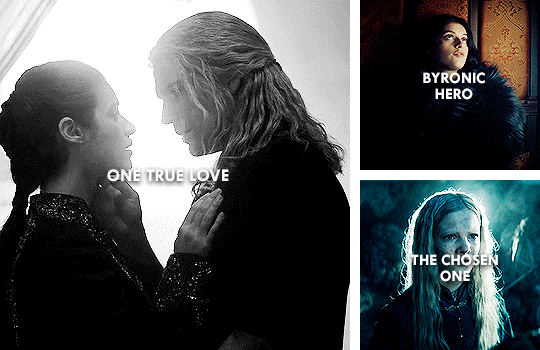
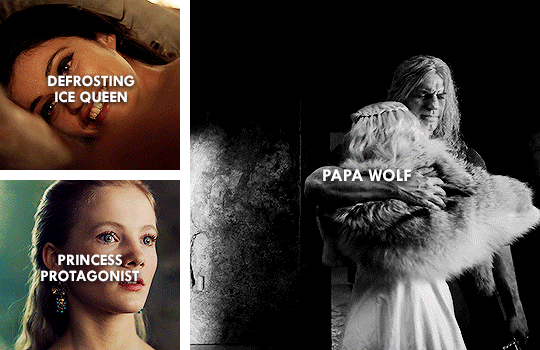
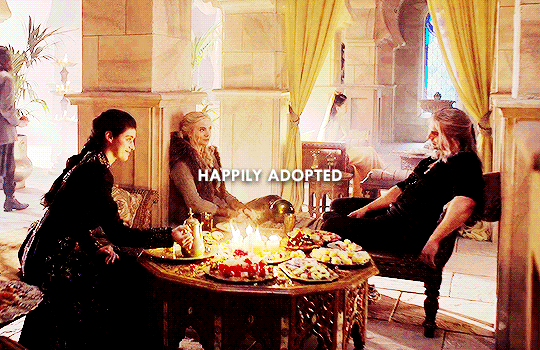
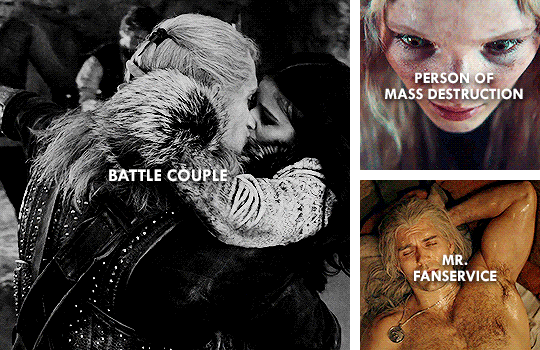
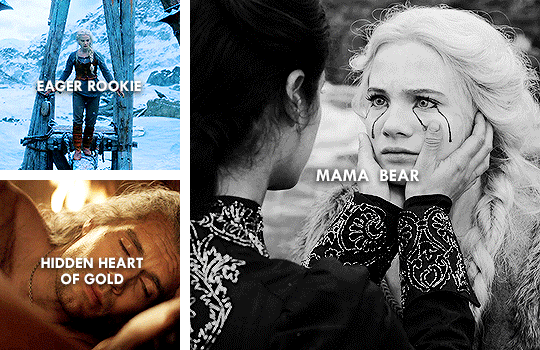
the fam + tv tropes
#thewitcheredit#one true family#**gifs#yeah i know the layouts fucked because the lines are too big#I'M AWARE#but have this anyway 😂😂#too lazy to redo it all lmao
628 notes
·
View notes
Text
stone butch that likes to be topped, call that hitting rock bottom
23 notes
·
View notes
Text
that one shakespeare quote that goes:
"If I were to kiss you then go to hell, I would. So then I can brag with the devils I saw heaven without even entering it"
Its such a Lockwood line and I'll tell you why. Everyone and their mother knows that Lockwood has a death wish, this is not new information, but i'd bet my hat that he thinks he's damned as well. That if there was a heaven or a hell he would inevitably end up damned because to him it just makes sense.
The only salvation he can truly find at first is in Lucy because how can someone like her who loves so fiercely love someone like him. Its unfathomable to him that he could have someone love him so unconditionally again, that there's something in him that's worth loving even after everything.
Obviously as time goes on and they're together that feeling of damnation fades and he starts seeing the true and honest good in himself but the point still stands. If he ends up in that firey pit he could look back upon his life and know exactly what heaven is like.
#sorry#had to get this out of my system#i'm insane#i'm aware#the voices won again with this one#my bad bro#lockwood and co#lockwood & co#lucy carlyle#anthony lockwood#locklye#lucy and lockwood#locklyle
85 notes
·
View notes
Text
Watching sewing videos with poes, we ran into one with a bird interlude. She was instantly obsessed, so I looked up a cat tv video featuring birds.
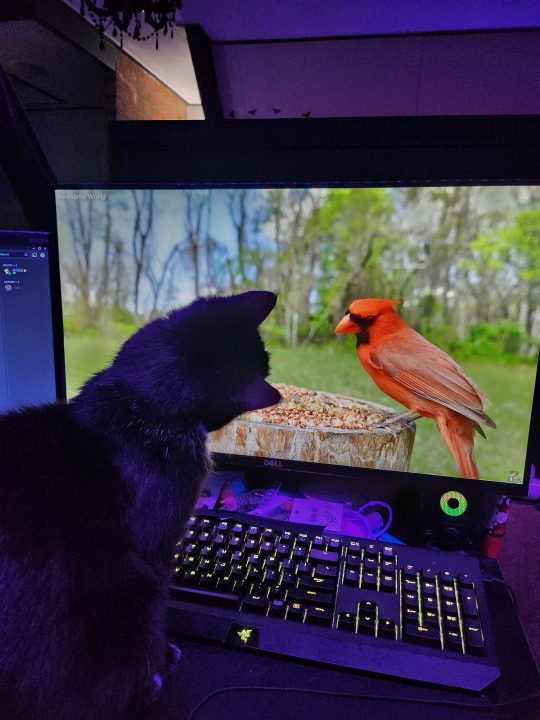
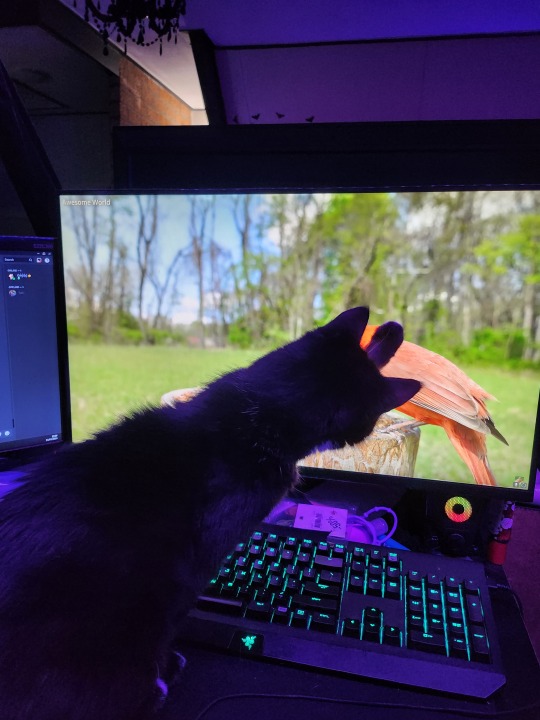
After trying to climb over my screen to get to the birds, she jumped off the desk, came back and watched for a long time.. and then she sighed.
#Yes I have a lot of stuff on my desk#my mannequin is wearing a garbage bag for her own safety#I'm aware#Just enjoy my 13 year old cat doing cat things#gwynn.txt#Do I need to add a tag for poes?#Poes pics#Cat
5 notes
·
View notes
Text

genuinely can't wait. As I've said many, many times, so many times it's probably getting a little bit weird, Adam is NOT invited to see this with me.
8 notes
·
View notes
Text
making a post analyzing a facet of a character only for someone else to make essentially the same post just less thorough months later and not only get more traction but also be praised for being the first person to Figure It Out™ is great for my npd
#yes i'm salty#yes this is petty#i'm aware#let me be unreasonable my brain needs this#buggy thoughts#buggy life
5 notes
·
View notes
Text


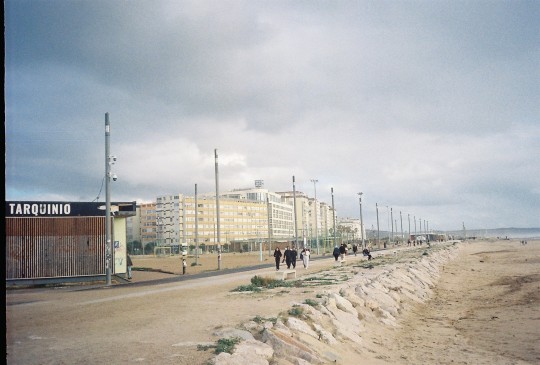



costa da caparica, portugal. february 2024
this roll... okaay did not know i could do that. not entirely sure what happened that day but wow every single thing i did that afternoon is a masterpiece and it was one of the most relaxing days the whole year. i'll be honest, it's making me much more secure in my choice to go study in lisbon if it means this is just a bus ride away <3
#photographers on tumblr#photography#digital archive#portugal#travel diary#film photography#35mm film#i know this is unusual for me#i literally posted yesterday#i'm aware#but also#have you seen this#this was too cool to not show yk
3 notes
·
View notes
Text

YOU WILL NOT BELIEVE THE DISTRESS I AM IN.
HE KEEPS COMING BACK TO ME. I MADE THIS. WHAT. LAST YEAR? LOOK AT ME NOW. NOTES KEEP COMING UP ON INSTAGRAM. I DESPISE THIS CREATION. I HÂTE YOU I HATE YOU SANDWICHTON I HATE YOU SAMMYTON PLEASE LEAVE ME QLONE
#teehee#deltarune#deltarune spamton#spamtong#spamton deltarune#i say posting this here. i know. i know.#i'm aware#but it'd funny tbh#i could live laugh love a bit longer seeing this#especially on tumblr#just instagram.#keeps coming back to me#j haven't touched it since last year#tell it to leave tell it to go NOW#cw caps#tw vomit
114 notes
·
View notes
Text
not to be dramatic but if I don't get tickets for the 13th I will cry my eyes out
5 notes
·
View notes
Text
Hey I've not been active here lately but, just so you know, I'm working on a sinful Frans extra Chapter for Damn you, Chara! at the moment.
Like, last year I've started a couple of extra chapters that I never finished, but this one is over a thousand words already and seems promising.
That's it :)
6 notes
·
View notes
Text
I know its been years and the fact that I am rewatching Hamilton at 2AM should tell you something about my mental state. but that moment where Hamilton goes "CALL ME SON ONE. MORE. TIME!-"
still the moment that makes my brain spit sparks and smoke.
#yeah yeah I have a theme#parental issues#I'm aware#this is the “my parents were bad people” blog#personal
9 notes
·
View notes
Text
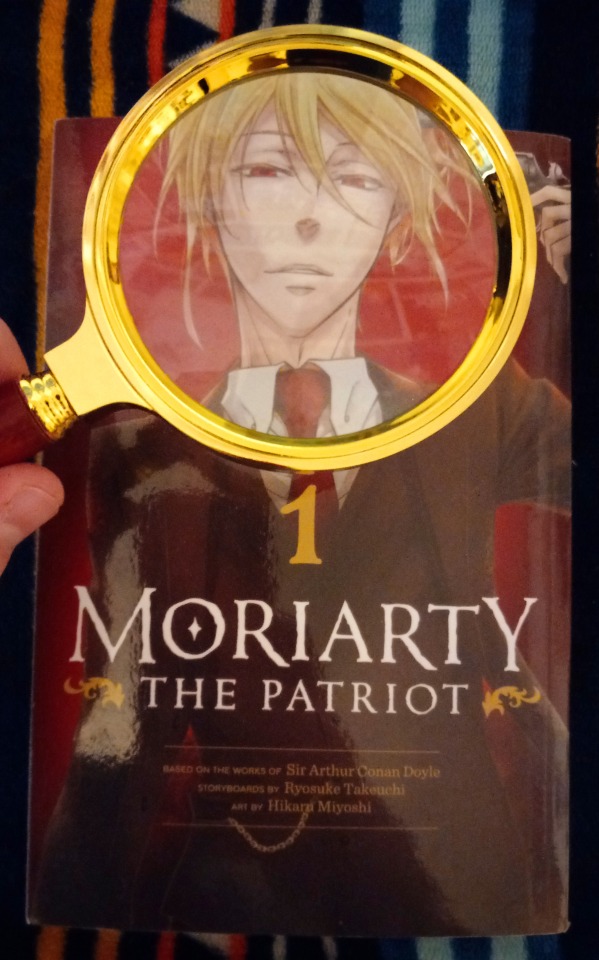
Happy Birthday to my favorite Napoleon (Lord) of Crime, William James Moriarty!
#my photo#yes#that is my thumb and finger you see#shocking#i'm aware#anyway#happy birthday liam#william james moriarty#professor moriarty#moriarty the patriot
18 notes
·
View notes
Text
Hate when you go to look up a character you're unfamiliar with on here and all you get is character group posts. Like, which one of you gay bitches is fuckwit mcnutsuckle? I don't know any of you and there's too many people in this incorrect quotes post to narrow it down
2 notes
·
View notes
Text
i got so anxious abt a sudden incest-y plot line in a show that i started like actually having a panic attack they cannot keep doing this
2 notes
·
View notes